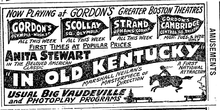Nathan H. Gordon
In the following year he returned to New England and with his brother Israel Gordon opened a slot-machine picture business at Worcester, Mass., placing machines in stores, penny arcades and elsewhere.
Secondarily, Gordon and Louis Mayer formed the Gordon-Mayer Theatrical Company, which booked talent for his theatres and distributed Metro's pictures.
More specifically, by late 1921, over 4,000 franchise holders were participating in a consolidated enterprise with an estimated value of $50 million for "the elimination of wasteful expense and for the betterment of the quality of photoplays and methods of exchanging and distributing films.
"[2] This limitation on its field of action, however, did not long continue, the corporation early developing into a product of motion pictures on a large scale, with an extensive plant at Burbank, Calif., and with some of the most popular film stars of that period, including Charlie Chaplin, Douglas Fairbanks and Mary Pickford, on its list of actors.
According to the Boston Daily Globe, the transaction was reportedly valued at $12 million and included Gordon's holdings in 38 moving picture playhouses in New England.
[4] Widely known for his philanthropic interests, he was a trustee of the Beth Israel hospital in Boston and a director of the Associated Jewish Philanthropies of that city and the Hebrew Ladies home at Dorchester, Mass.
A man of innumerable private charities, he helped many of his employees to build homes and at Christmas time made gifts to hundreds of children.
Possessing great energy, courage and driving power, he overcame the handicap of serious ill health in his youth and became a successful and respected figure in the motion picture industry.

